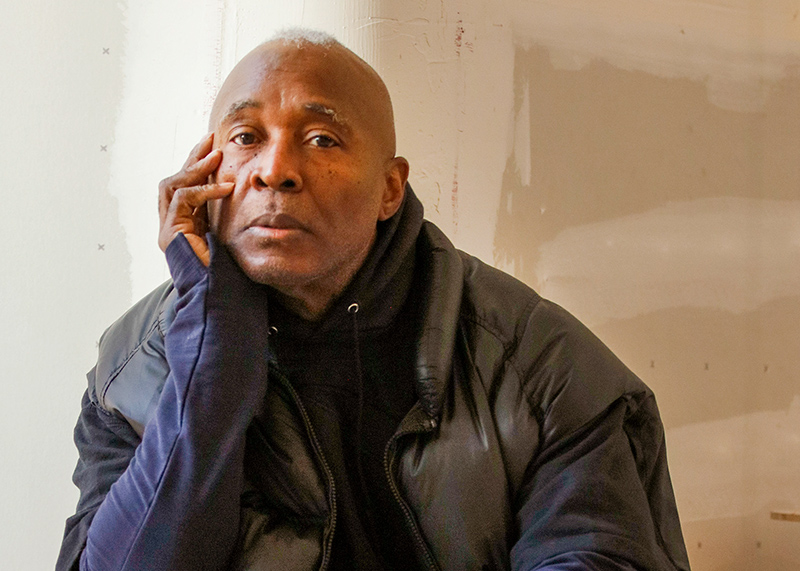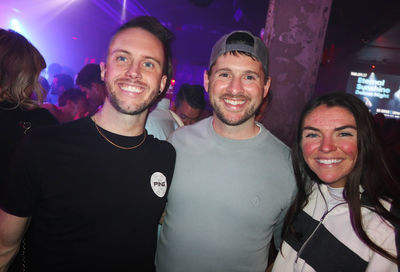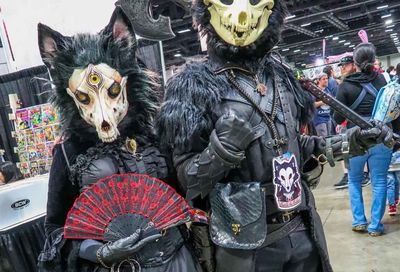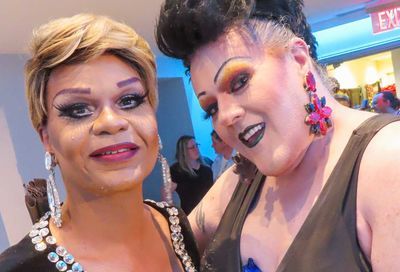Exit, Stage West
After helping nonprofits grow in D.C., Earl Plante looks to L.A. and The Trevor Project
Locals might wish they had more time to get to know Earl Plante, who came to Washington just shy of four years ago. But during that time — during which he has been at both the National Minority AIDS Council and the National Black Justice Coalition — Plante has had an impact on D.C.-based institutions dear to the community. But that’s just on his career track.
With NBJC, Plante also served for a time as board president. Until a few days ago, he did the same with One In Ten, the local GLBT arts and culture group that produces the annual Reel Affirmations GLBT film festival.

Earl Plante
These affiliations are part of the Plante package. Back in New York, Plante served as president of the Bronx Community Pride Center and of the New Festival, a GLBT film festival. Involvement is just par for Plante’s course.
”It’s about the passion, being affiliated and believing in the organization’s mission,” says Plante. ”I wouldn’t spend my time and effort otherwise. We have a limited time on this earth and I want to be sure I’m giving my all. It’s fundamental and very visceral. You feel it at a very innate level. So wherever I’ve worked over the years, I’ve had a connection. I look forward to continuing that work and doing whatever I can to help the movement move forward.”
At this stage in his life, giving his all means returning to Southern California, where he spent most of his youth. Plante’s mother, a veteran of Woodstock and his role model, needs him as she recuperates from a hit-and-run accident that happened about two months ago.
”She’s had several surgeries. I’m going there to help her recover, which is going to take six months to a year.”
But Plante’s mother won’t be the sole recipient of Plante’s passion. Moving to Los Angeles, he’ll also be taking on the role of chief development officer of The Trevor Project, effective Sept. 2. The Trevor Project, named for the 1994 gay film short, Trevor, operates the only national, 24-hour crisis/suicide-prevention hotline for GLBTQ youth.
In the meantime, the NBJC has announced that Connecticut State Rep. Jason Bartlett (D), the first openly gay African-American state legislator, will be coming on as deputy director, taking over many of Plante’s responsibilities.
”We’re very sorry to lose Earl from the staff,” says H. Alexander Robinson, NBJC CEO. ”He really helped move the board forward. But there are always changes like this that create opportunities and options for us. We’re very excited about what Jason brings.”
Over at One In Ten, Margaret Murray, executive director, says Lisa King, now the board’s vice president, will fill in as interim president, at least until board elections in January.
”I’m sad to see Earl go, as board president and as a friend,” says Murray, adding that Plante saw the organization through its first audit while serving as president.
While the interim won’t give Plante much time for his favorite hobby of traveling — dream trip: Cannes, during the film festival — it’s at least time for Washington, and Plante, to say good-bye.
METRO WEEKLY: Your bio shows you attended Dartmouth. Did you study finance, since that’s where you’ve ended up?
EARL PLANTE: No, I just gravitated to that over time. I started off as a grassroots organizer, and that kind of evolved.
The movement that’s nearest and dearest to my heart is the feminist movement. My mom went to Woodstock. She is someone who impressed those values on me at a very early age. I come from a mixed background — my father is black, my mom is white — so that kind of perspective was ingrained in me at an early age. College was a very instrumental time. I was kind of able to explore my mixed identity, in addition to dealing with my coming out. There were a lot of issues I dealt with when I was in college.

Earl Plante
MW: You entered Dartmouth in ’90? How old are you?
PLANTE: In September I’ll be 36.
MW: So you were at Dartmouth after the anti-apartheid ”shanty wars”?
PLANTE: We did have one major incident when I was freshman. The Dartmouth Review, in their masthead was a quote from one of the presidents that was changed to a quote from Mein Kampf. So we had this massive rally on the green, like 10,000 people. 20/20 was there and it was a big to-do. That’s when I got my bona fide baptism on campus.
Whenever my name was in The Dartmouth Review, that’s when I knew I had a good week. [Laughs.] I was very involved. I was head of the Black Student Union, while at the same time being head of the Gay Student Union. It always seemed like I was pushing the envelope in certain respects and organizing people or pushing issues on a progressive level.
It was an interesting environment at Dartmouth. After Princeton, I think it’s the most conservative of the Ivies. It was a tough go for me. Not coming from a well-to-do background didn’t help at all.
MW: When you talk about that background, your parents and Woodstock…
PLANTE: I should mention to you that one of the formative moments in my life, one of the big reasons I do the work that I do in terms of trying to bridge perspectives, bringing people together from different backgrounds and orientations and cultures, is that I come from a mixed background, obviously. But my father was killed when I was 5 years old by a racist, white cop. That was kind of the signature moment in my life. That moment instilled in me, at a very early age, the difficulties of society, in terms of it being against miscegenation, mixing of the races. That’s why I’ve dedicated my life to nonprofit activism to try to bring people from different backgrounds together.
MW: What happened? How did your family recover?
PLANTE: I was so young, I didn’t really understand. I vaguely remember what happened. I have a couple pictures of my father and vague notions of memories, but not too much.
I was told about [the details when] I was in college. I’m an only child, so my mom and I are very close. It was mentioned one time by her, I think because it was so painful. Therapy helped me deal with that. I had my first therapy in college to help me deal with my mixed background, my father’s death and coming out. There were all these different things I was dealing with.
MW: Was your father involved in a protest? A random run-in?
PLANTE: It was a ”driving while black” kind of thing. It was before the heyday of Rodney King and more media attention, so it was swept under the rug.
MW: Your background seems extremely political. How would you describe your youth?
PLANTE: One of the things I wrote in my essay to college was that my mom is my role model, because she really had a difficult situation. She was working two or three jobs. We were on welfare for a while, and homeless for a bit. But I never felt want for anything. She always put her best spin on it, and she’s not someone who likes to wallow in self-pity. She’s a nurse and has delivered over a thousand babies in her lifetime, so she’s my role model on many different levels. She’s had to deal with a lot of adversity and keep on going.
MW: Beyond the politics, you also have this love of the arts — movies and theater, specifically.
PLANTE: Theater is the thing I miss the most about New York. At my peak, I was seeing six or seven shows a week. Now I go for long weekends and see four or five. When I move to L.A., I’ll have to give that up, so that’s a bit of a disappointment.
MW: But with L.A., maybe there’s a chance we’ll see you pop up in a commercial or a TV show?
PLANTE: You never know. [Laughs.]
After I get acclimated and my mom is better, I might see what I can do with Outfest. It’s probably the largest [GLBT] film festival in the country. But I want to take a break from boards for a while until my mom’s recovery.
MW: Despite the work you’ve done in D.C., leaving New York must’ve been tough for you.
PLANTE: It was a difficult time for me, dealing with leaving the bulk of my friends and associates and people I look up to in the movement who were based in New York City. And dealing with a break-up, too.
I was trying to get acclimated to a new city and meeting new people, so that first year was very difficult. I focused on work primarily. It took me almost to the end of that year before I even wanted to venture out to try to do some board work. I think it was around the same time I joined One In Ten.
MW: Away from the arts and back to the money, you said that you gravitated to that. Were you following a natural aptitude, or was fundraising/finance something you had to learn?
PLANTE: Growing up in a not well-to-do background gives you an appreciation for money and how to save it. I think my first training was serving on an undergraduate finance committee, which is one of the larger committees at Dartmouth. We would give out money to other organizations on campus.
Running a number of organizations, there was obviously financial, fiscal management. I started off doing house parties and that evolved. I’ve always been a strong writer, and I started grant writing.
If you break down things to their most concise components, from grant writing to events to individual donors, you learn by doing. It’s pretty straightforward in terms of success: You either make the money or you don’t. You have benchmarks and goals. In that respect, there’s not much nuance there.
MW: What about raising money for NBJC? Has that been easy or difficult compared to other places you’ve worked?
PLANTE: This December will mark our fifth anniversary. We’ve had bumps along the way, but I think [NBJC] is on the move in terms of overall approach.
We’re just in the middle of a strategic-planning initiative, which will kind of map out the organization’s future for the next three to five years. That entails financials, fundraising, everything nuts-and-bolts about the organization.
The other thing that’s unique in terms of color, organizing at the LGBT level, is there’s no [national] Asian group, no Latino or Native-American group. We’re basically it.
There are opportunities as well as challenges based on that. We have to kind of [bear] the load for the people-of-color LGBT movement, so we’re looked at very closely.
MW: Will you continue to be involved with NBJC after you move?
PLANTE: I might be involved once I get settled. One of [NBJC’s] long-term goals is to try to create steering committees in different localities around the country, and I would certainly be willing to spearhead that effort in Southern California, L.A. in particular. Certainly, I will continue to be a donor.
MW: You’ve told me what you miss about New York, but what will you miss about Washington?
PLANTE: The thing I’ll miss most is, irrespective of which side of the aisle you fall on, everyone I know here, even if they don’t work in the political arena, has a very strong mindset and approach to how this world is running. And they have opinions. They’re not shy about letting you know that. I love the engagement. That’s a good thing, and people in this city seem to really thrive on it.
MW: What will you not miss?
PLANTE: I won’t miss the fact that, in certain respects, it’s a small city. People commute to the city and don’t live here, so that has an impact in terms of the social scene. I think there’s some transitory nature to how social interactions in general take place here. In my tenure in New York, there was more of a mixing in terms of black and white. Here, it seems more segregated. That was kind of surprising to me.
MW: Do you have family aside from your mother, or friends, in the L.A. area?
PLANTE: No, so it’s kind of like D.C. all over again in that respect. Though I have a couple of friends out there, mostly people I’ve worked with in the movement.
MW: Is this an exciting time for you?
PLANTE: Yes, I’m excited, but also a bit daunted because it is a new experience, but I think it presents lots of opportunities.
The current [Trevor Project] executive director [Charles Robbins], who has been there for about a year and a half, has done some wonderful things already. He’s more than doubled the budget. I’m looking forward to working with him and the rest of his team, making sure that the organization continues its positive growth patterns.
MW: Are you moving out alone, or do you have a partner?
PLANTE: No, I’m going out solo. In that respect, I view that as a positive as well because I haven’t had much luck in terms of dating in D.C.
MW: That doesn’t bode well for your chances of ever moving back, does it?
PLANTE: You never know. I’m definitely committed to coming back for the inauguration. I’m a very early supporter of Obama, so I’m really thrilled.
MW: What excites you about the move overall, and with The Trevor Project in particular?
PLANTE: The move presents a new area for me to engage — and to re-engage in an area where I grew up. That’s exciting. It’s been almost 20 years.
Professionally, the transition can be difficult, but I’m looking forward to the challenge. Working directly with LGBT and questioning youth is something I’ve wanted to do for quite some time.
This is a very exciting time to live. If you look at the larger movement, our movement in respect to other mass movements, we’ve made amazing progress since ’69. I’m only 35, but kids are coming out a lot younger and there’s no way that I would have even fathomed coming out in high school. It’s a very exciting time to support our youth as much as we can.
It’s a generational transformation that’s happened, not just in our movement, but across the board in American society. With the Obama-McCain situation, you have two different generations running against each other. I think the generation that’s supporting McCain is not going to be with us much longer. That’s very exciting to me: if [Obama] is elected, how that will — in literal and figurative terms — change the political, economic and social landscape in not just America, but the world. I’m getting excited and energized about how that will move us forward as a movement.
As we move forward with the conventions and the debates that are scheduled, it will be pretty clear what the choices are. The differences couldn’t be more clear.
MW: That political excitement reminds me of the environment you mentioned during your Dartmouth years. What was it like to come out there?
PLANTE: I’ve thought a lot about this. There was all this internal angst that goes into the coming-out process. It’s a very personal experience for all of us, but the bottom line: Most of my close friends and my mom were like, ”Okay, it’s about time.” It wasn’t a groundbreaking moment. It was kind of anti-climactic, to be honest with you.
MW: Speaking of coming out, with your love of movies, does it mean something special to you that The Trevor Project evolved from a gay, short film?
PLANTE: I remember how moved I was by seeing that on HBO. It had a big impact on me in terms of seeing someone who was struggling with fundamental identity questions. We can all relate to that, but Trevor did it in such a nuanced, creative and moving way. It’s about tolerance, acceptance, about truth. It’s about living your own truth, and that’s something we can all admire and aspire to.
LGBT arts, and film in particular, have had a huge impact in terms of creating consciousness, not just for our community, but for societal acceptance in the mainstream. If you look at The Times of Harvey Milk and And the Band Played On, all the different [GLBT movies] that have come theatrically, the increased availability on Netflix and Blockbuster and being able to see stuff in your home, it’s good and bad. It presents opportunities and challenges for film festivals, because it’s not a unique thing anymore to have a gay movie. We’re a more sophisticated clientele. Just because there’s a gay character or a gay sensibility doesn’t guarantee success. We’ve become more critical and more discerning. We expect more.
That’s why it goes back to a very transformational, exciting time to be living, to be doing this work. We’re seeing the changes in our mirror, especially with our youth.
For more information about the National Black Justice Coalition, visit them online at www.nbjcoalition.org. For One In Ten, visit www.oneinten.org. For The Trevor Project, visit www.thetrevorproject.org. The Trevor Helpline is 866-4-U-TREVOR (866-488-7386).
Support Metro Weekly’s Journalism
These are challenging times for news organizations. And yet it’s crucial we stay active and provide vital resources and information to both our local readers and the world. So won’t you please take a moment and consider supporting Metro Weekly with a membership? For as little as $5 a month, you can help ensure Metro Weekly magazine and MetroWeekly.com remain free, viable resources as we provide the best, most diverse, culturally-resonant LGBTQ coverage in both the D.C. region and around the world. Memberships come with exclusive perks and discounts, your own personal digital delivery of each week’s magazine (and an archive), access to our Member's Lounge when it launches this fall, and exclusive members-only items like Metro Weekly Membership Mugs and Tote Bags! Check out all our membership levels here and please join us today!
























